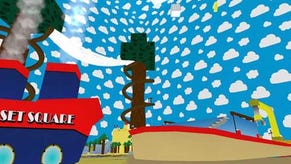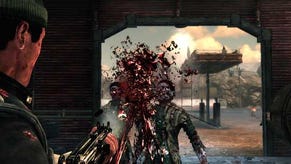Unreal Tournament 3 And The New Lazarus Effect
We probably should have talked more about what's been going on with Unreal Tournament 3 over the last couple of weeks. Why didn't we? Because it's not a game any of us feel particularly strongly about one way or another, and from earlier comments it didn't look like you lot did either. Having a famous name and being reasonably fun is no longer enough for a technically adept but fundamentally unambitious multiplayer shooter to grab the attention it once would have done.
Last weekend, that changed dramatically. Unreal Tournament is back, baby, back. And no matter how you or we or anyone else might personally feel about UT3, its unexpected resurgence may signal colossal change for PC games.
The popular perception is that UT3 bombed. Did it? Well, at first it certainly seemed as much - reportedly it shifted just 33,995 US copies during its first month on sale. Epic later claimed that it had shipped 1.2million copies worldwide in four months, but that includes the US PS3 release and, of course, 'shipped' and 'sold' are far from the same. While there was probably a good deal of exaggeration from both sides of the debate, certainly the half-decade old Unreal Tournament 2004 continued to enjoy a visibly larger regular playerbase than its higher-tech sequel.
Now, traditionally it's the case that when a multiplayer game stumbles, it doesn't get back up again. UT3 seemed destined to go gently into that good night, save for the occasional antagonistic comment about PC gaming from Cliffy "Cliffy B" B and Mark Rein. And yet, as we coast into the Spring of 2009, a game released in 2007 is suddenly the talk of town all over again. On the weekend before last, its players jumped by some 2000%.
The key to it all was taking a leaf out of Valve's book. There may not be such a thing as a free lunch, but that truism doesn't mean hungry folk won't turn up in droves if you stick up a poster promising complimentary punch and pie. The Team Fortress 2 free weekends, many timed to coincide with major updates, drew hordes of players who were delighted to get something for nothing. Come the end of each weekend, a fair few were charmed enough to splash out for a permanent copy of the game.
Epic have done exactly that with UT3, releasing a major patch (complete with new maps and modes as well as more fundamental changes based on player feedback) then offering it free via Steam to all comers for a long weekend. Once the first free weekend was over, its 2000% extra players didn't all disappear - the game (heavily discounted) jumped straight to the top of Steam's bestseller list. It did so well that there's just been another free weekend, though observers reckon that's partially by way of apology to the people who, as a result of higher-than-anticipated interest, couldn't download the game first time around. Who knows if it'll truly reverse UT3's long-term fortunes, but it's almost definitely earned a big pile of money from a game we all thought had died in the water a year ago.
It's an incredible precedent to set: making a game a success almost 18 months after a poor launch. It's something that could only have happened now, and with a system like Steam. Something that can go far beyond a mere demo by delivering a complete game straight to your hard drive and automatically deactivating it at the distributor's discretion. Something that silently updates a purchase with patches and extra content automatically, so you don't have to make the decision to seek out some exciting new feature: it's just there anyway. Something that, if you don't already own it, advertises that game to you at an agreeably reduced price whenever it loads. Something that enjoys a vast community who are in turn plugged into a sea of smaller relevant communities.
It's incredibly sinister. It's also incredibly exciting. UT3 may never be a cult classic - or indeed any sort of classic - but it's no longer a failure. Think about what this could mean for other, better future games in similar danger of being lost to uncaring history. There is now a mechanism to save them: if something with as negative a reputation as UT3 can come back from the dead, surely anything can. The next Planescape: Torment or Beyond Good & Evil will be less of a risk, less of a tragedy waiting to happen. It's not Steam or Impulse specifically as much as it is game distributors finally realising how to leverage the internet, and that a game doesn't stop existing once its initial print run disappears from store shelves. Game retail and traditional advertising alike have never seemed such dinosaurs.
I mean, really. How any other platform could possibly think it can rival PC gaming's staggeringly vast, fast-evolving, hyper-connected community in the long-term is beyond me.









